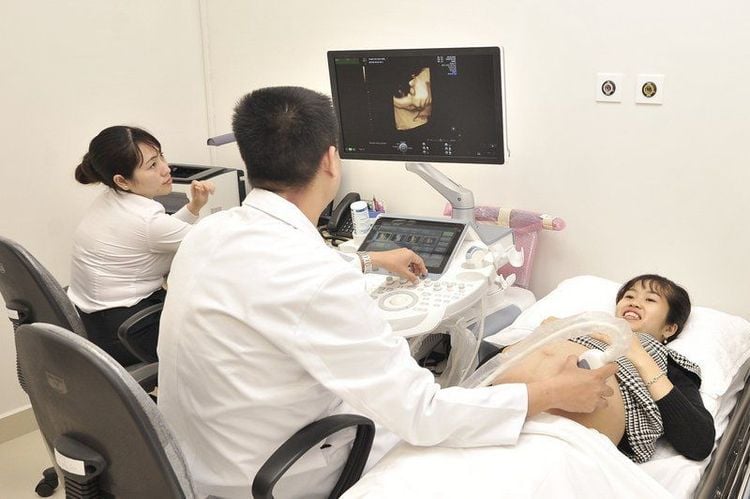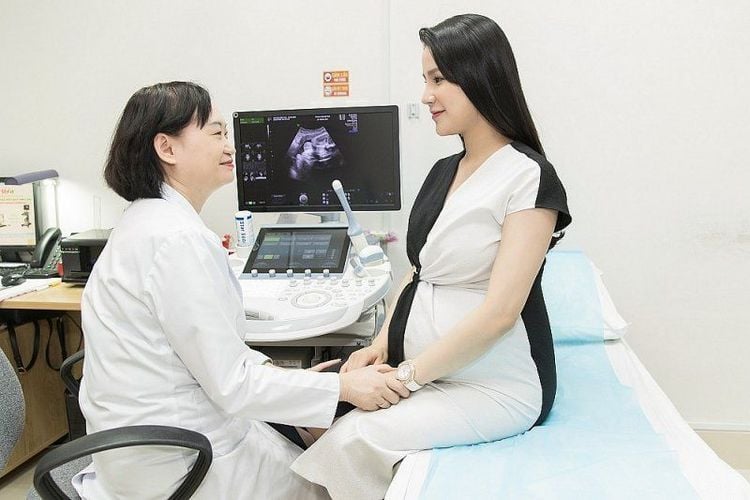This is an automatically translated article.
The article is professionally consulted by Master, Doctor Trinh Thi Thanh Huyen - Department of Obstetrics and Gynecology - Vinmec Hai Phong International General Hospital.
Morning sickness during pregnancy is a very uncomfortable condition for women, which can significantly affect daily life. However, morning sickness during pregnancy is a physiological phenomenon, so it does not affect the baby, except for severe morning sickness.
1. Overview
Morning sickness is a common sign of pregnancy, characterized by nausea and sometimes actual vomiting. Morning sickness has the English name "morning sickness", this sign can be uncomfortable for pregnant women at any time of the day, not just in the morning. Up to 90% of women experience varying degrees of nausea or vomiting during pregnancy.Morning sickness usually appears during 14 weeks of pregnancy and this is almost the first sign that a woman is pregnant. Some women may also experience morning sickness that lingers throughout their pregnancy.
There are different ways to relieve morning sickness, this condition also very rarely leads to complications. Although controversial, some studies have shown that women with little or no morning sickness have a higher rate of miscarriage. Another theory is that morning sickness during pregnancy is nature's way of keeping a mother away from substances that are potentially harmful to her developing baby.
Trắc nghiệm: Chế độ dinh dưỡng 3 tháng đầu thai kỳ của mẹ bầu như thế nào?
3 tháng đầu được coi là giai đoạn phát triển quan trọng nhất của thai nhi. Để phát triển toàn diện, thai nhi cần được cung cấp đầy đủ dưỡng chất, đặc biệt là các vi chất cần thiết. Làm bài trắc nghiệm dưới đây sẽ giúp bạn có thêm kiến thức về chế độ dinh dưỡng trong 3 tháng đầu thai kỳ.The following content is prepared under supervision of Bác sĩ chuyên khoa I, Lê Hồng Liên , Sản phụ khoa , Khoa Sản phụ khoa - Bệnh viện Đa khoa Quốc tế Vinmec Central Park
2. Causes of morning sickness
There is no exact cause of morning sickness during pregnancy, and the severity of morning sickness varies from woman to woman. Increased hormone levels during the first few weeks of pregnancy are the most common cause. Low blood sugar is another reason for morning sickness. Nausea and vomiting are also often triggered by some strong smell, hot spicy food, saliva... or even no trigger at all.People who often experience nausea or vomiting due to motion sickness, migraines, allergies to certain smells or tastes are also more likely to experience morning sickness during pregnancy. Other factors that can aggravate morning sickness include:
First pregnancy; Twins or triplets; Pregnant with a baby girl; Have had severe morning sickness before; Family history of severe morning sickness; Exposure to estrogen (eg in oral contraceptives) prior to pregnancy; Weak body, too tired; Obesity (BMI ≥ 30); Stressful, emotional; Travel often. In a woman, morning sickness can also vary between pregnancies. For example, if you had severe morning sickness when you were pregnant with your first child, you may experience very mild morning sickness in subsequent pregnancies.

3. Complications of morning sickness
Nausea and vomiting easily lead to loss of appetite, so many pregnant women worry that this will adversely affect the baby in the womb. In fact, mild morning sickness is usually not harmful. Morning sickness is usually not severe enough to interfere with fetal growth and development.For some pregnant women, the feeling of nausea and vomiting causes them to lose a lot of weight. This is called severe morning sickness (Hyperemesis Gravidarum - HG), which causes an electrolyte imbalance and uncontrolled weight loss. If left untreated, the condition carries the risk of severe dehydration or a loss of more than 5% of your pre-pregnancy body weight, most dangerously harming your baby.
Call your doctor right away if you have:
Continuous, uncontrollable vomiting; Lose 1-2 kg or more; Fever; Urinary frequency/strain, dark urine; lightheadedness, dizziness, or fainting; heart palpitations; Severe nausea in the second trimester;

4. Treatment of morning sickness
4.1. Prescription Drugs There is no definite effective treatment for morning sickness. Every woman, even a single pregnancy, is different. However, the doctor can prescribe additional pills or medicine to reduce nausea and help pregnant women eat better. Prescription medications include:Antihistamines: Helps relieve nausea and motion sickness; Phenothiazine: Control severe nausea and vomiting; Metoclopramide (Reglan): Helps the stomach accelerate food into the intestines and prevents nausea and vomiting; Antacids: Absorb stomach acid and help prevent acid reflux; Note that pregnant women should not arbitrarily use these drugs without a doctor's prescription.

Vitamin B-6 supplements; Multivitamin for pregnant women before giving birth; Products extracted from ginger, such as wine, tea and syrup; Pretzels; Acupuncture; Hypnosis. If you want to try these therapies, you still need to discuss them with your doctor first.
4.3. Tests Based on your symptoms, your doctor may order some tests to make sure that both you and your baby are safe. Specifically:
Urine test : Helps determine if you are dehydrated; Blood biochemistry screening: Including complete blood count (CBC), electrolytes,... to determine if you are malnourished, or lacking in certain vitamins, anemia; Ultrasound: Checks to see if the fetus is growing at a healthy rate.

5. Prevent morning sickness
The following tips can help pregnant women prevent or minimize nausea:Drink plenty of water, before and after meals; Rest; Keep the house and workplace well ventilated; Eliminate scents that make you nauseous; Avoid tobacco smoke, spicy and fatty foods; Eat several small meals throughout the day; Snacking before getting out of bed in the morning and throughout the day; Take a vitamin supplement at night. If nothing has worked for you, or if you're still experiencing morning sickness after the first three to four months, it's important to talk to your doctor. Also, before starting to stop any medication or try a remedy, it's important to consult with your doctor about these options.
At Vinmec International General Hospital, there is a package maternity service as a solution to help pregnant women feel secure because of the companionship of the medical team throughout the pregnancy. When choosing Maternity Package, pregnant women can:
The pregnancy process is monitored by a team of highly qualified doctors Regular check-ups, early detection of abnormalities The Package Maternity package helps to facilitate convenient for the birthing process Newborns get comprehensive care

Master. Trinh Thi Thanh Huyen is highly trained in obstetric ultrasound, laparoscopic surgery and hysteroscopy at the National Hospital of Obstetrics and Gynecology and has more than 13 years of experience working at Hai Phong Obstetrics and Gynecology Hospital.
Currently, the doctor is an Obstetrician and Gynecologist at Vinmec Hai Phong International General Hospital
Please dial HOTLINE for more information or register for an appointment HERE. Download MyVinmec app to make appointments faster and to manage your bookings easily.
Reference source: healthline.com; mayoclinic.org; webmd.com; nhs.uk













